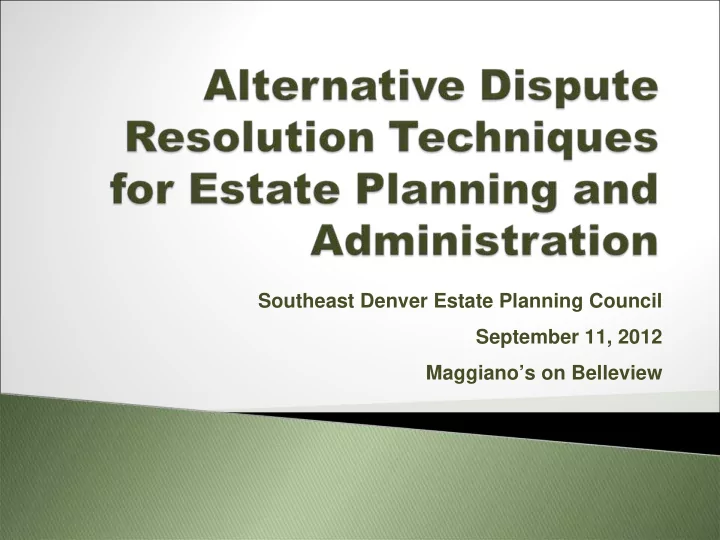

Southeast Denver Estate Planning Council September 11, 2012 Maggiano’s on Belleview
2 nd and 3 rd Marriages (“blended families”) Siblings Parents/Children Burial
Can last a lifetime
Traditional approaches ignore potential problems and “hope for the best” in terrorem clauses Aspirational messages ADR Provisions mandatory arbitration clauses mediation clauses
Disappointed Expectations Anger Resentment Revenge Litigation Frustration Dissatisfaction
Facilitator can identify issues and interests and assist families to anticipate and avert conflicts Helps people move away from “principles” “I don’t need the money” ◦ “I don’t want the money” ◦ “Parent(s) always liked you better” ◦
Statistics reveal that the use of the civil public trial has fallen into disuse. • Less than 1% of cases filed in Colorado currently go to trial • Majority of procedure is taken up with motions, discovery, pre-trial maneuvering, etc.
Congested Slow Delays/continuances Expensive Stressful Non-permanent (appeals) Public Mismatched abilities Too formal, rule-based
Rule 2.1 Advisor . . . . In a matter involving or expected to involve litigation, a lawyer should advise the client of alternative forms of dispute resolution that might reasonably be pursued to attempt to resolve the legal dispute or to reach the legal objective sought.
Problem-solving methods or techniques [Appropriate] Dispute Resolution
Adjudication Negotiation Evaluation Facilitation
Appointed Judge Binding Arbitration Special Master
Referred to in some states as “private judge” CRS § 13-3-111 and Rule 122 CRCP - At least 6 years on state or federal bench - Consent of the parties - At “no cost to the state” - Jury may be impaneled
Best used: when parties want to preserve appellate rights When special substantive expertise or procedural experience in tribunal is desired When speed, efficiency and scheduling are considerations When privacy is a concern-although a “record” is preserved, the parties have more control over what is made public
Expense-quantifiable Timely Subject matter experience Ideal for: • Complex matters that require management • Simple matters that deserve expeditious disposition
Rule 53 CRCP, Rule 53 FRCVP The exception, not the rule Special expertise, calculation of damages, findings of fact, special circumstances
Expertise Efficiency Specialization
A process by which a neutral determines the facts relevant to a dispute May be a Special Master
A process where an acceptable third party or a panel of acceptable third parties listens to the information presented by all sides to the dispute and renders a decision Non appealable
Finality Relative Informality Expense
Negotiation is direct, private, efficient, cost effective, fashioned to meet the individual needs of the parties Attorneys may or may not be involved
Attorneys are poor predictors of outcomes Overestimate chances of success Higher confidence level was lower predictor of outcome Older, more experienced attorneys fared poorest Female attorneys better than male counterparts Goodman-Delahunty, Jane; Granhog, Pars Anders; Hartwig, Maria; Loftus, Elizabeth F., Insightful or Wishful: Lawyers’ Ability to Predict Case Outcomes , Psychology, Public Policy and Law
With or without third party neutral Mediation Collaborative Law Facilitation
A process where a neutral third party facilitates a discussion between disputants for the purpose of resolving a conflict
– a neutral third party, trained to assist the parties in negotiating an agreement. The mediator has no independent authority and does not render a deciding opinion, but rather assists the parties in creating solutions that reflect their interests and goals.
When a system or a process for handling something has gone awry Remediation
Remediation-”defendant” seeks to repair the alleged damage and avoid litigation, award of damages, etc. • Estate where Personal Representative was not properly guided by the attorney and both were facing a surcharge/malpractice action.
Finding a way to fix a wrong
Third party neutral serves as an “evaluator” Advises the interested parties about the possible, potential and probable outcomes if the case were to proceed to trial Third party neutral assists by assigning dollar amounts to the projections Evaluator may also prompt and persuade to urge interested parties to move towards compromise
Settlement Conference Summary Jury Trial or Mini-Trial Non-binding Arbitration Early Neutral Case Evaluation
Evaluator hired by the lawyers/parties or appointed by the court: narrows the issues in the case assists with development of a discovery plan works with attorneys/parties to conduct appropriate case management, including development of CMO, if needed evaluator may assist parties negotiate a settlement, if asked
Best used: where case issues are complex and the services of a neutral expert on substance or process would be valuable; where discovery and motions could become unwieldy
Typically conducted by a retired judge; in federal court (until recently) by Magistrate Judges Parties are separated and neutral shuttles back and forth delivering offers, counteroffers and applying pressure to parties to reach a settlement number Sometimes referred to as “mediation” or “evaluative mediation”
Best Used: Where the impartial expertise of a substantive expert can aid the parties in negotiation by evaluating case strengths and weaknesses
Summary Case Summary Case Presentation Presentation • to a jury (may be provided • to a neutral or panel by court or hired) selected by the parties or by the court Jury provides an advisory • Neutral/panel provides an verdict advisory decision/opinion Summary Jury Trial Mini Trial
Arbitrator or panel hears adversarial presentations and issues an award that is not binding on the parties; although they may be free to accept and apply it
Med/Arb Arb/Med Neutral Fact Finding followed by Mediation Mini-Trial or Summary Jury Trial followed by Mediation
Clients are almost exclusively other attorneys
Colorado State Courts: Office of Dispute Resolution See Dispute Resolution Act, C.R.S. §13-22-301 et seq. Federal Courts: Civil Justice Reform Act of 1990 provides that federal courts must consider the possibility of referring appropriate cases to ADR programs Tenth Judicial Circuit – pre-argument Conference Program
Strengthen Your Settlement Posture • Case Valuation and Settlement Recommendation • Settlement Statement Recommendations • Settlement Video • Mediation Assistance, including witness prep • Case Settlement/Case Valuation Mock Trials Prepare for a More Persuasive Arbitration • Mock Arbitration • Arbitration Message Preparation • Witness Preparation for Arbitration
Recommend
More recommend